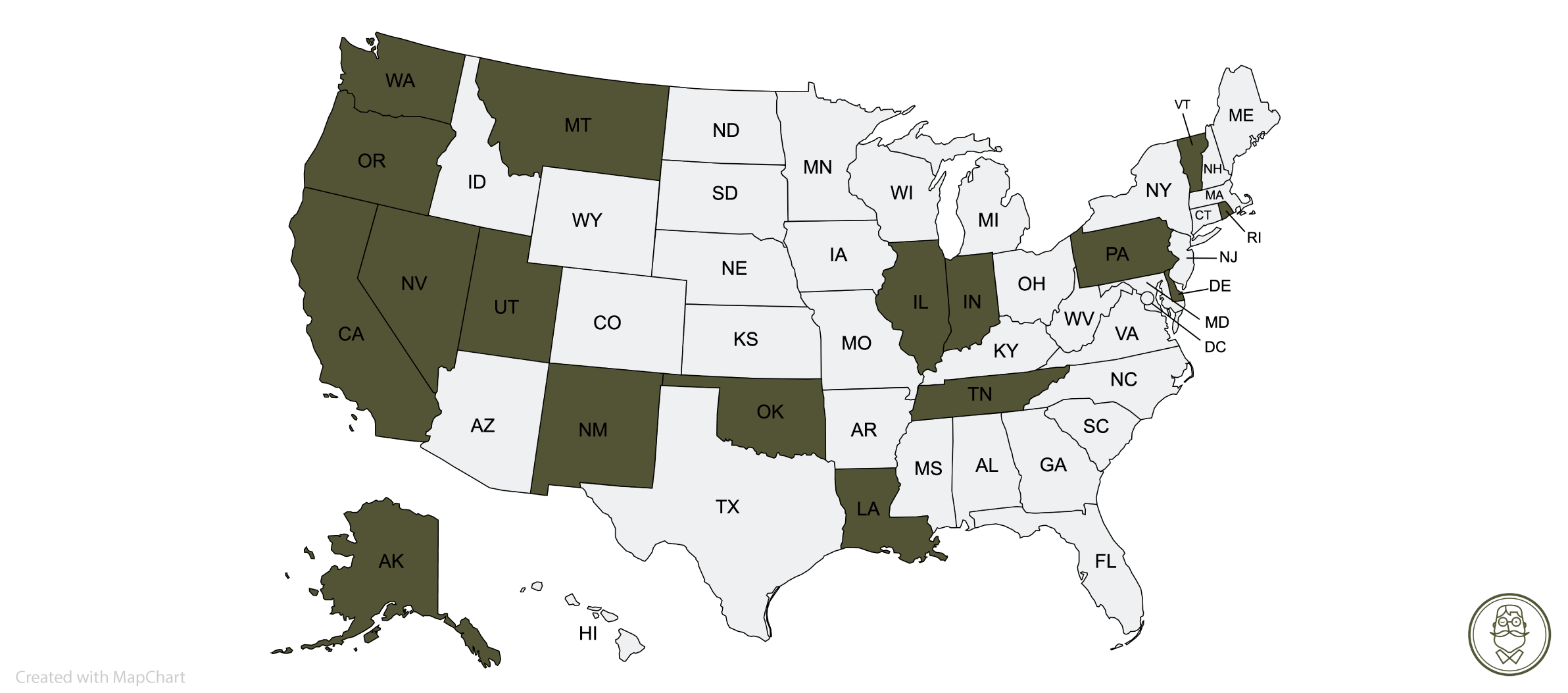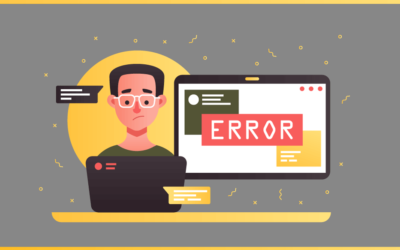Which States Require Mandatory Alcohol Server Training?

What is Alcohol Server Training?
Alcohol server training teaches business owners, managers, bartenders and servers about responsible serving practices. At a minimum, it typically covers the following four areas of education:
- State liquor laws
- Identifying intoxicated persons
- Identifying minors
- Techniques for intervening
The History of Alcohol Server Training
Responsible alcohol servers can have an impact in reducing the number of intoxicated drivers and the incidences of underage drinking. It is this thinking that led many states to vote for a mandatory alcohol server training program.
In 1987, Oregon became the first state to institute a mandatory alcohol server education program. Interestingly enough, the idea for the program did not come from the Oregon Liquor Control Commission (OLCC), but from the hospitality industry.
Soon thereafter, several other states followed suit and began implementing programs of their own. The most recent state to require training is also the largest by population. On July 1, 2022, California’s program took effect, requiring an estimated 1,000,000 alcohol servers at some 56,000 establishments to complete training within the first 60 days.
How States Approach Alcohol Server Training – Voluntary vs. Mandatory
Each state approaches alcohol server training very differently. While some have gone so far as to make it mandatory for all individuals involved in the sale and service of alcohol, most have taken a more lenient approach by introducing a voluntary program. And a small handful have yet to implement any policies regarding alcohol server training.
When Alcohol Server Training is Voluntary:
In states where alcohol server training is voluntary, the liquor control board encourages program participation by creating incentives for licensees.
An example of one common perk is if an establishment is found in violation of a state liquor law, the board will take program participation into consideration as a mitigating factor when administering fines and other penalties. Some states have even published different penalty schedules for businesses with trained servers versus ones without.
In New York, Connecticut, Georgia, Maryland, Minnesota and Nebraska, alcohol server training is voluntary, but “highly recommended” by the state, making program participation in these states almost equivalent to that of states where training is mandatory.
Lastly, when alcohol server training is voluntary by state law, liquor control boards often choose to mandate it for single businesses that have been cited for a liquor violation or even all businesses in targeted areas where liquor violations frequently occur.
When Alcohol Server Training is Mandatory:
In 17 states, alcohol server training is mandatory from the get-go.
States that require alcohol server training establish penalties for failure to complete training, usually within a specific number of days after hire. These penalties can be directed at servers or licensees.
While fewer states issue penalties directly at servers, the majority seek to hold the licensee responsible for ensuring their employees are current with training. Thus, licensees track their employees’ certification status to avoid fines or liquor license suspension if inspected by the liquor control board.
Some states require all alcohol servers to complete training, while others only require the liquor licensee and/or managers to complete training. For the purposes of the table below, the mandatory column represents states that require all alcohol servers to complete training.
State Training Requirements for Alcohol Servers
| State | Mandatory | Voluntary | No Law | Notes |
|---|---|---|---|---|
| Alabama | x* | Required for 020 Type licensees hiring 19 and 20 year olds to serve alcohol. | ||
| Alaska | x | |||
| Arizona | x | Required for licensees and managers. | ||
| Arkansas | x | |||
| California | x | |||
| Colorado | x | Required for anyone serving alcohol at tastings. Training must be in-person. | ||
| Connecticut | x | |||
| Deleware | x | |||
| Florida | x | |||
| Georgia | x* | Required for delivery drivers. | ||
| Hawai'i | x* | Regulated by county, not state. Required for managers in most counties. | ||
| Idaho | x* | |||
| Illinois | x | |||
| Indiana | x | Also required for "salesman" (employees of wholesale distributors). | ||
| Iowa | x | |||
| Kansas | x | |||
| Kentucky | x* | Required for alcohol servers by local ordinances throughout most of the state. | ||
| Louisiana | x | |||
| Maine | x* | |||
| Maryland | x | Required for licensee or designated employee on duty. | ||
| Massachusetts | x | |||
| Michigan | x | Required for licensees and all managers on duty. | ||
| Minnesota | x | |||
| Mississippi | x | |||
| Missouri | x* | |||
| Montana | x | |||
| Nebraska | x* | |||
| Nevada | x | Also required for security guards. | ||
| New Hampshire | x | Required for licensees or designated managers. | ||
| New Jersey | x* | |||
| New Mexico | x | |||
| New York | x | |||
| North Carolina | x | Required for licensees. | ||
| North Dakota | x* | |||
| Ohio | x | |||
| Oklahoma | x | Also required for hotel employees who stock hotel room mini-bars. | ||
| Oregon | x | |||
| Pennsylvania | x | |||
| Rhode Island | x | Also required for employees that check ID and valet parking staff. | ||
| South Carolina | x | |||
| South Dakota | x | |||
| Tennessee | x | |||
| Texas | x | |||
| Utah | x | Also required for anyone selling alcohol to be consumed off-premise. | ||
| Vermont | x | Also required for employees selling alcohol and tobacco in Vermont stores. | ||
| Virginia | x | |||
| Washington | x | |||
| Washington D.C. | x | Required for managerial employees. | ||
| West Virginia | x | |||
| Wisconsin | x | Required for at least one manager on duty during business hours. | ||
| Wyoming | x* | |||
| *Required in some municipalities and/or counties. See below for more information. | ||||
Which Local Governments Require Alcohol Server Training?
As noted in the above table, since many states have yet to vote mandatory alcohol server education into law, some local governments have taken over and adopted it at a city or county level.
The following are examples of local governments that require some form of alcohol server education (for owners, managers, servers or a combination):
- Alabama – City of Tuscaloosa
- Georgia – City of Savannah
- Hawai’i – Counties of Honolulu, Maui, Hawai’i, Kaua’i
- Idaho – City of Boise
- Kentucky – Many Cities and Counties
- Maine – Cities of Portland, Bangor and Acton
- Missouri – Cities of Branson, Cape Girardeau, Columbia and St. Joseph
- Nebraska – Cities of Lincoln, Kearney, Ogallala, and North Platte; County of Otoe (including Nebraska City)
- New Jersey – City of Hoboken
- North Dakota – Cities of Williston, Dickinson, Grand Forks, Fargo, Watford City, and West Fargo
- Wyoming – City of Cheyenne
Although training is not required at a state level in Kentucky, a whopping 108 cities and counties have ordinances mandating Responsible Beverage Server (RBS) Training! The Kentucky Department of Alcohol Beverage Control has its own RBS Training Program called Server Training in Alcohol Regulation (STAR). 45 cities and counties in Kentucky require alcohol servers to take the STAR Program, while the rest are more lenient and accept training from various other in-person and online training programs.
It is interesting to note that in Hawai’i, counties regulate alcohol sales and service rather than the state. This means all four of the primary counties in Hawai’i come equipped with their own individual liquor control agency and laws. Additionally, they have all adopted training requirements for alcohol service, with each county providing the education and testing itself.
In the City and County of Honolulu, training is required for all managers and bartenders. The Honolulu Liquor Commission offers both online and in-person classes to obtain either an “Employee Liquor Card” or a “Manager Liquor Card.”
In the County of Maui, every liquor licensed business must have one designated, trained employee in charge at all times the premises is open for business. The alcohol server training is obtained through the Maui County Department of Liquor Control.
In the County of Hawai’i, the Hawai’i County Department of Liquor Control also requires that one person over the age of twenty-one at each business become certified.
In the County of Kaua’i, the Kaua’i Department of Liquor Control takes it a bit further, requiring managers and assistant managers of both on-premise and off-premise establishments to pass a county-issued exam. Passing earns managers of on-premises establishments a “Blue Card” and managers of off-premise establishments a “Red Card.”
A Deeper Look at States With Mandatory Alcohol Server Training
Each state liquor agency has a different name for its alcohol training program, with many states leaning heavily on acronyms. But the certification issued with program completion usually takes on a name of its own based on colloquial usage.
For example, the Oregon Liquor and Cannabis Commission (OLCC) refers to certification descriptively as an “Alcohol Service Permit,” however it’s far more common to hear people working in the industry refer to it as an “OLCC Permit.” Unfortunately, this has caused confusion since the OLCC’s certification for persons working in the marijuana industry has also acquired the same local nomenclature.
States that require mandatory alcohol server training have details of the training program written into law. Oftentimes, these details even include specific topics to be covered within the curriculum. On one end of the spectrum, Alaska takes a minimalist approach by simply stating that “subjects… shall be determined… by the board”. On the other end of the spectrum, California requires coverage of a 285 point outline.
While a few states offer the training themselves, most approve courses from third-party providers after a thorough review is made. After course completion, servers usually receive a certificate or credit card-sized permit with a unique ID number and expiration date to track when training must be retaken.
Mandatory Alcohol Server Training States
| State Agency | Program Name | Certification Name | Renewal | State Course | State Approved Course Providers | |
|---|---|---|---|---|---|---|
| Alaska | Mandatory Alcohol Server Training | TAP Card, Alcohol Server Card | 3 Years | N | In-person/Livestream | |
| California | Responsible Beverage Service (RBS) Training | RBS Certification | 3 Years | N | In-Person | Online |
| Delaware | Responsible Server Training | Server Training Card | 4 Years | Y | Online | |
| Illinois | Beverage Alcohol Sellers and Servers Education and Training (BASSET) | BASSET Card | 3 Years | N | In-Person | Online |
| Indiana | Server Training | Employee Permit | 3 Years | Y | In-Person | Online |
| Louisiana | Responsible Vendor (RV) Program | RV Bar Card | 4 Years | N | In-Person | Online |
| Montana | Responsible Alcohol Sales and Service (RASS) Training | RASS Certification | 3 Years | N | In-Person | Online |
| Nevada | Alcohol Awareness Training | ACT Card, Alcohol Card | 4 Years | N | In-Person | Online |
| New Mexico | Alcohol Server Education | Alcohol Server Permit | 3 Years | N | In-Person | Online |
| Oklahoma | Responsible Beverage Service and Sales Training | Alcohol Beverage Employee License | N/A | Y | In-Person | Online |
| Oregon | Alcohol Server Education | OLCC Permit, Alcohol Service Permit | 5 Years | N | In-Person | Online |
| Pennsylvania | Responsible Alcohol Management Program (RAMP) Seller/Server Training | RAMP Certification | 2 Years | N | In-Person | Online |
| Rhode Island | Alcohol Server Training | Alcohol Server Certification | 3 Years | N | In-Person | Online |
| Tennessee | Alcohol Awareness Training | Server Permit | 5 Years | N | In-Person | Online |
| Utah | Alcohol Server Training | On-Premise Training Certification | 3 Years | N | Online | |
| Vermont | 1st Class Server Training | On-Premise Alcohol Certificate | 2 Years | Y | Online | |
| Washington | Mandatory Alcohol Server Training (MAST) | MAST Permit | 5 Years | N | In-Person | Online |
Notes on the above table:
- Alaska – The Alaska Alcohol & Marijuana Control Office requires servers to take training in-person. Online training is permitted through a scheduled live video class presentation only. The law allows servers to renew their certification every three years by passing an exam to show they have retained an understanding of training course subjects.
- California – Servers can find a list of approved training providers after creating an account in the California Department of Alcoholic Beverage Control’s online portal. The provider list may be easily sorted by criteria such as language and online versus in-person classes.
- Delaware – Prior to the COVID pandemic, training was offered free of charge by the Delaware Division of Alcohol and Tabacco Enforcement through in-person classes held in each county. Currently, it remains to be seen if these classes will be offered again.
- Illinois – The Illinois Liquor Control Commission has approved online training programs, however, it recommends enrolling in a live classroom the first time taking a BASSET course. Some Illinois municipalities may not accept online programs. Check with your local ordinances first.
- Indiana – The Indiana Alcohol & Tobacco Commission offers online, certified server training free of charge, but it also allows third parties to provide server training certification.
- Louisiana – Servers can find approved courses for the Responsible Vendor Program after creating an account in the Louisiana Office of Alcohol & Tobacco Control’s online portal. The course list may be easily sorted by criteria such as language and online versus in-person.
- Montana – In addition to online courses, state-certified trainers offer in-person training free of charge or for a nominal fee. Available classes are listed on the Montana Alcoholic Beverage Control Division’s training calendar.
- Nevada – While courses can be taken online, all student testing must be proctored in-person at a location (“Alcohol Awareness Site”) approved by the Nevada Commission on Postsecondary Education.
- Oklahoma – Free virtual and in-person classes are offered by the Oklahoma Department of Mental Health, in collaboration with the Oklahoma Alcoholic Beverage Laws Enforcement Commission (ABLE). Employees are responsible for renewing their license every two years to keep it current. If their license is allowed to expire, training must be retaken. Otherwise, training remains current.
- Pennsylvania – A separate RAMP class is required for owners/managers (board-approved managers that are on the license itself). This class is only offered by the Pennsylvania Liquor Control Board. The first time an individual enrolls in owner/manager training, they must attend the training in a classroom setting. Subsequent training may be completed in-person or online.
- Rhode Island -Training may be taken from an online provider, but the final exam must be completed in-person in the presence of an approved proctor. Once the proctor sends passing exam test results back to the training provider, the provider can issue certification.
- Vermont – The Vermont Department of Liquor and Lottery (DLL) offers online and classroom/virtual seminars for $25 per person, and it certifies instructors to provide in-house training at bars and restaurants. It has also approved training programs for a few select 3rd party vendors. Although not conveniently listed on the DLL’s website, these companies’ names can be seen on the images of “Approved Training Certificates.”
Nuances of Mandatory Alcohol Server Training
Like Hawai’i, Nevada does not have a state agency that regulates liquor laws. Although there are state laws regarding the manufacture, distribution, and sale of alcoholic beverages, the majority of laws are created at the county and city levels.
Generally, county laws take precedence, unless a city within the county has chosen to incorporate, allowing it the ability to create its own set of laws. For this reason, if you wish to obtain a license to sell or serve alcohol, you must obtain the license from either the city or county, depending on local precedence.
Nevada state law does require training for alcohol servers and security guards. Since there is no state liquor agency, the Nevada Commission on Postsecondary Education has been placed in charge of managing the state’s Alcohol Beverage Awareness Program. With minimal oversight, it approves training providers and fields complaints.
In most states, training expires after three to five years and must be retaken. However, in Wisconsin, renewal is rarely necessary. Additionally, Wisconsin is an example of a state where training is only required for one manager on duty, and the process to obtain certification is fairly nuanced.
After completion of training from an approved provider, servers must take their training certificate with them to their municipality (city, village, town) and apply for an Operator’s License, also colloquially referred to as a Bartender’s License.
An Operator’s License is only valid in the municipality that issued it. As long as a server continues to hold an Operator’s License, the server never has to retake training. If a server allows their license to lapse for more than two years, then training must be retaken to obtain another Operator’s License.
The Role Insurance Plays in Alcohol Server Training
Obviously, the state has an impact on whether employers require their employees to complete training, but there is another major contributing factor to consider.
Speaking from personal experience, one of the first surprises that comes with opening a bar is the cost of Liquor Liability Insurance. The quote can leave you speechless.
In many states, insurers will offer a discount on liquor liability policies to companies that require all employees to complete alcohol server training. In Michigan, insurance companies are actually required by state law to offer such a discount. This is sufficient motivation for employers to round-up certification from all their employees and submit it to their insurance carrier.
Going one step further, some liability insurance carriers will not cover an alcohol-related incident if the staff members are not state alcohol certified. But that’s enough about insurance companies!
Employers deserve some credit. No one is busier than a restaurant or bar owner and making sure that employees take training and stay current with training takes time.
Regardless of state laws or insurance premiums, many employers go to the trouble of requiring alcohol server training just because they realize it promotes legal and responsible sales and service of alcoholic beverages, and this benefits their community.
We Welcome Your Feedback
For this news article, we took great care to research state, county and city laws regarding alcohol server training, and to clarify confusing legal terminology to ensure you understand those laws.
As a small team of researchers, we understand that state laws are constantly changing. If you feel that information in this article needs to be brought up-to-date or even if you simply just have something interesting to add, please email us at [email protected] or leave us a comment below so we can follow-up.
Take Alcohol Server Training From Craft Serving!
Like this article, our online alcohol server training courses are detailed, organized and useful. Unlike this article, they feature fun videos and interactive lessons developed by bartenders with years of experience working in the service industry. Click here to find a course for your state.
Thanks for checking out this article! If you found it helpful, feel free to share it or leave us a comment.
Below are links to some of our other Alcohol Server Education related news posts. Check them out and be sure to let us know if there is a topic you are interested in learning more about. We will try and cover it in our next news update!
Sarah Travis
Co-Founder and Bon Vivant
Craft Serving, LLC
Don’t be a stranger:
+ Instagram: https://www.instagram.com/craftserving
+ Facebook: https://www.facebook.com/craftserving
+ LinkedIn: https://www.linkedin.com/company/craft-serving
+ Twitter: https://twitter.com/craftserving
+ Website: www.craftserving.com
+ Email: [email protected]
1 Comment
Submit a Comment
OTHER NEWS
New Alcohol Delivery Rules in Washington
TIMELINE OF ALCOHOL DELIVERY IN WASHINGTON In 2020, COVID pandemic shutdowns brought about major hardships for the food the beverage industry. In response, the Washington State Liquor & Cannabis Board (WSLCB) temporarily loosened restrictions and allowed...
Tips to Help Bartenders Execute Successful Pop-Ups
Photo by Erin Schaeferle for Rémy Cointreau At the 2023 Bartender’s Circle Summit in Seattle, WA, Chris Elford had some great advice for bartenders interested in launching a pop-up. Here is a summary of some of the key takeaways. WHY SHOULD YOU USE POP-UPS TO MARKET...
The Top 5 National Events for Bartenders
Photo Courtesy of Caitlyn Ridenour for Camp Runamok WHY SHOULD BARTENDERS CONSIDER ATTENDING EVENTS? If you love bartending as much as we do, then you are probably looking for ways to continue growing in your field. Events for bartenders are a great way to stay on top...
Renew Your MAST Permit With Craft Serving
HAS IT BEEN FIVE YEARS? Let’s cut to the chase and assume that you already used our MAST Permit Checker to lookup the status of your MAST Permit. Either you discovered that your MAST Permit is about to expire or that it has already expired (whoops 😬). You know what...
Free Resources for Restaurant Workers
THE RESTAURANT INDUSTRY Prior to the pandemic, the foodservice and restaurant industry was the Nation’s second-largest private-sector employer, providing jobs for 10% of the total U.S. workforce. Restaurants struggled financially during the pandemic but innovated and...
Finding the Best MAST Class for You
THREE TYPES OF MAST CLASS PROVIDERS For many of the online MAST class providers, it’s difficult, if not impossible to find out who owns the company or even, where the company is located. The good news is, we’ve done the research, so you don’t have to. From the...
Help for Technical Issues
A Troubleshooting Guide We have done our best to make our website compatible with all devices and browsers, but sometimes user settings or other unknowns can cause issues. Our local team of customer service representatives are quick to respond to inquiries during...
Press Release: New RBS Training Provider in California!
Craft Serving is the newest RBS Training course provider in California! As such, it’s online course is modern, relevant and user-friendly.
Navigating the Best of Seattle Cocktail Week
The Warmup: Bar Takeovers in Belltown We kicked off Seattle Cocktail Week on a Tuesday with a visit to Trade Winds Tavern for some Big Buck hunting with Chris Elford and a bar takeover by the Fernside team from San Diego. Fortunately, our slow pump-action skills...
Do I Need a MAST Permit to Work an Event?
Did you volunteer to serve wine at an upcoming, local fundraiser? Or maybe you just got asked to pour drinks at your friend’s wedding. If you plan on serving alcohol at an event, you may be wondering if you need to get a MAST Permit. In Washington, whether you are...










Thanks for the information